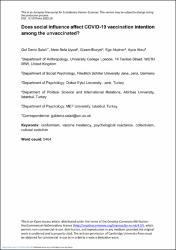Please use this identifier to cite or link to this item:
https://hdl.handle.net/20.500.11779/1826| Title: | Does Social Influence Affect Covid-19 Vaccination Intention Among the Unvaccinated? | Authors: | Bozyel, Gizem Uysal, Mete Sefa Akpınar, Ege Aksu, Ayça Salalı, Gül Deniz |
Keywords: | Collectivism Vaccine hesitancy Psychological reactance Cultural evolution Conformism |
Publisher: | Cambridge University Press | Source: | Salali, G. D., Uysal, M. S., Bozyel, G., Akpinar, E., & Aksu, A. (11 July 2022). Does social influence affect COVID-19 vaccination intention among the unvaccinated ?. Evolutionary Human Sciences, pp. 1-23. https://doi.org/10.1017/ehs.2022.29 | Abstract: | Conformist social influence is a double-edged sword when it comes to vaccine promotion. On the one hand, social influence may increase vaccine uptake by reassuring the hesitant about the safety and effectiveness of the vaccine; on the other, people may forgo the cost of vaccination when the majority is already vaccinated - giving rise to a public goods dilemma. Here, we examine whether available information on the percentage of double-vaccinated people affects COVID-19 vaccination intention among unvaccinated people in Turkey. In an online experiment, we divided participants (n = 1013) into low, intermediate, and high social influence conditions, reflecting the government's vaccine promotion messages. We found that social influence did not predict COVID-19 vaccination intention, but psychological reactance and collectivism did. People with higher reactance (intolerance of others telling one what to do and being sceptical of consensus views) had lower vaccination intention, whilst people with higher collectivism (how much a person considers group benefits over individual success) had higher vaccination intention. Our findings suggest that advertising the percentage of double-vaccinated people is not sufficient to trigger a cascade of others getting themselves vaccinated. Diverse promotion strategies reflecting the heterogeneity of individual attitudes could be more effective. | URI: | https://doi.org/10.1017/ehs.2022.29 https://hdl.handle.net/20.500.11779/1826 |
ISSN: | 2513843X |
| Appears in Collections: | COVID-19 Konulu Yayınlar Koleksiyonu Psikoloji Bölümü Koleksiyonu PubMed İndeksli Yayınlar Koleksiyonu / PubMed Indexed Publications Collection Scopus İndeksli Yayınlar Koleksiyonu / Scopus Indexed Publications Collection WoS İndeksli Yayınlar Koleksiyonu / WoS Indexed Publications Collection |
Files in This Item:
| File | Description | Size | Format | |
|---|---|---|---|---|
| does-social-influence-affect-covid-19-vaccination-intention-among-the-unvaccinated.pdf | Full Text - Article | 927.77 kB | Adobe PDF |  View/Open |
CORE Recommender
SCOPUSTM
Citations
10
checked on Nov 16, 2024
WEB OF SCIENCETM
Citations
8
checked on Nov 16, 2024
Page view(s)
28
checked on Nov 18, 2024
Download(s)
10
checked on Nov 18, 2024
Google ScholarTM
Check
Altmetric
Items in GCRIS Repository are protected by copyright, with all rights reserved, unless otherwise indicated.